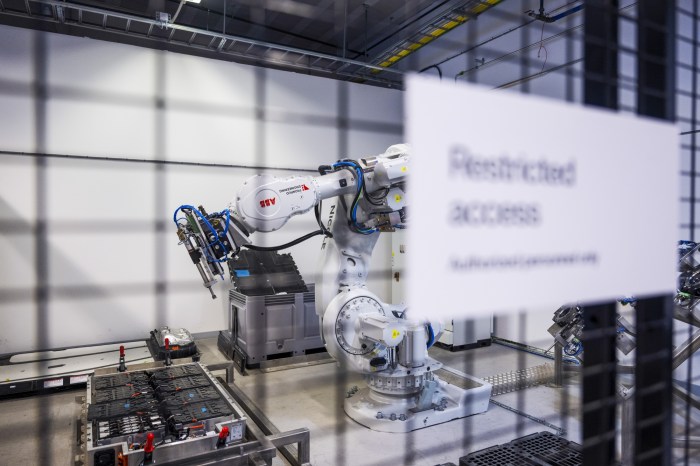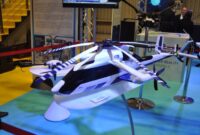Northvolt targets zero emission aviation superior lithium metal battery – Northvolt targets zero emission aviation with a superior lithium metal battery, a game-changer that could revolutionize the aviation industry. This innovative technology holds the potential to significantly reduce the environmental impact of air travel, ushering in a new era of sustainable flight.
While electric planes are not a new concept, the limitations of current battery technology have hindered their widespread adoption. Northvolt’s breakthrough in lithium metal batteries offers a compelling solution, promising increased energy density, longer range, and faster charging times.
The aviation industry is a major contributor to global greenhouse gas emissions. Transitioning to zero-emission aviation is critical to mitigating climate change, and Northvolt’s technology is poised to play a pivotal role in this transformation. The development of these advanced batteries could significantly impact aircraft design, manufacturing, and the overall evolution of the aviation industry.
Northvolt’s Lithium Metal Battery Technology
Northvolt, a European battery manufacturer, is making significant strides in the development of lithium metal batteries, a promising technology that could revolutionize the aviation industry. These batteries offer several advantages over conventional lithium-ion batteries, particularly in terms of energy density and weight, making them ideal for applications requiring long-range flights and increased efficiency.
Performance Comparison with Other Battery Technologies
The performance of Northvolt’s lithium metal battery technology compares favorably to other battery technologies currently used in aviation.
- Lithium-ion batteriesare the dominant battery technology in aviation, offering a good balance of energy density, power density, and cost. However, their limited energy density restricts the range of electric aircraft.
- Lithium-sulfur batterieshave higher theoretical energy density than lithium-ion batteries but face challenges in terms of cycle life and safety.
- Fuel cellsoffer high energy density but are complex and require bulky hydrogen storage systems.
Northvolt’s lithium metal battery technology offers a compelling alternative, combining the advantages of high energy density and power density with improved safety and cycle life.
Impact on the Aviation Industry
Northvolt’s lithium metal battery technology has the potential to significantly impact the aviation industry by enabling the development of longer-range and more efficient electric aircraft.
- Increased Range:The higher energy density of lithium metal batteries allows for greater storage of energy, enabling electric aircraft to fly longer distances without needing to refuel or recharge as frequently. This could lead to the development of electric aircraft capable of transcontinental flights.
- Improved Efficiency:The lighter weight of lithium metal batteries compared to conventional lithium-ion batteries reduces the overall weight of electric aircraft, resulting in improved energy efficiency and reduced fuel consumption.
- Reduced Emissions:Electric aircraft powered by lithium metal batteries have the potential to significantly reduce greenhouse gas emissions, contributing to a cleaner and more sustainable aviation industry.
Key Features and Advantages
Northvolt’s lithium metal battery technology offers several key features and advantages over conventional lithium-ion batteries:
- Higher Energy Density:Lithium metal batteries have a higher theoretical energy density than lithium-ion batteries, allowing for more energy to be stored in the same volume or weight. This translates to longer flight ranges for electric aircraft.
- Improved Cycle Life:Lithium metal batteries can withstand more charge-discharge cycles before their performance degrades, extending their lifespan and reducing the need for frequent battery replacements.
- Enhanced Safety:Northvolt has developed advanced safety features for its lithium metal batteries, including improved electrolyte formulations and specialized battery management systems, to mitigate the risk of thermal runaway and ensure safe operation.
- Lower Cost:Northvolt is working towards reducing the cost of lithium metal batteries through optimization of manufacturing processes and economies of scale.
Zero Emission Aviation
Aviation, a cornerstone of global connectivity, faces a pressing need for sustainable alternatives. Traditional aircraft, powered by fossil fuels, contribute significantly to greenhouse gas emissions, accelerating climate change. The International Civil Aviation Organization (ICAO) estimates that aviation accounted for 2.5% of global carbon dioxide emissions in 2018, and this figure is projected to increase without substantial changes.
The urgency to transition to zero-emission aviation is undeniable, as the environmental impact of air travel continues to grow.
Obtain a comprehensive document about the application of how to update macos as unsafely as possible that is effective.
The Challenges of Transitioning to Zero-Emission Aviation
The transition to zero-emission aviation presents significant challenges, requiring innovative solutions across multiple domains. One of the primary hurdles is the limitations of current battery technology. Electric aircraft require batteries with high energy density and low weight to achieve sufficient range and payload capacity.
Current battery technologies, while rapidly advancing, still fall short of meeting these demanding requirements. Additionally, the infrastructure needed to support electric aviation, including charging stations and maintenance facilities, needs to be developed and scaled. Regulatory frameworks must also adapt to accommodate the integration of electric aircraft into existing air traffic management systems.
The Role of Battery Technology in Achieving Zero-Emission Aviation
Battery technology plays a pivotal role in achieving zero-emission aviation. Key considerations include weight, energy density, and charging time. * Weight:Batteries are inherently heavier than fossil fuels, posing a significant challenge to electric aircraft design. Weight reduction is crucial for optimizing range and payload capacity.
Energy Density
The energy density of a battery determines the amount of energy it can store for a given weight. Higher energy density batteries are essential for extending the range of electric aircraft.
Charging Time
The time required to charge electric aircraft batteries is a critical factor, especially for long-haul flights. Faster charging technologies are necessary to minimize ground time and maintain operational efficiency.
- Example:The Airbus E-Fan X, a hybrid-electric aircraft currently under development, utilizes a 2.0-megawatt electric motor and a 2-megawatt turboprop engine. This hybrid approach aims to address the limitations of current battery technology by combining electric propulsion with a traditional engine for longer flights.
Northvolt’s Role in the Future of Aviation

Northvolt’s ambition extends beyond powering electric vehicles; the company is actively shaping the future of aviation by developing advanced lithium-metal batteries that could revolutionize air travel. With a commitment to sustainability and a focus on cutting-edge technology, Northvolt is poised to play a crucial role in the transition to zero-emission aviation.
Strategic Goals and Initiatives
Northvolt’s strategic goals in the aviation sector are driven by the need to address the significant environmental impact of air travel. The company aims to develop high-energy-density lithium-metal batteries that can meet the demanding requirements of aircraft, enabling the development of zero-emission aircraft.
- Increased Energy Density:Northvolt is focused on achieving significantly higher energy density in its batteries, enabling longer flight ranges for electric aircraft. This is critical for overcoming the range limitations currently faced by electric aircraft.
- Improved Safety and Reliability:Safety and reliability are paramount in aviation. Northvolt is committed to developing batteries that meet the stringent safety standards of the aviation industry, ensuring the safe operation of electric aircraft.
- Reduced Weight and Size:Weight is a crucial factor in aviation. Northvolt’s batteries are designed to be lightweight and compact, minimizing their impact on aircraft performance and efficiency.
- Fast Charging Capabilities:Northvolt is exploring fast-charging technologies to reduce turnaround times for electric aircraft, improving operational efficiency.
Key Partnerships and Collaborations
Northvolt understands the importance of collaboration in accelerating the development and adoption of its battery technology in the aviation sector. The company has established strategic partnerships with key players in the aerospace industry, including:
- Airbus:Northvolt and Airbus have entered into a strategic partnership to develop and integrate high-performance lithium-metal batteries for future electric aircraft. This collaboration leverages the expertise of both companies, combining Northvolt’s battery technology with Airbus’s aircraft design and development capabilities.
- Rolls-Royce:Northvolt is collaborating with Rolls-Royce on the development of electric propulsion systems for aircraft. This partnership focuses on integrating Northvolt’s batteries with Rolls-Royce’s electric propulsion technology, creating a comprehensive electric aircraft solution.
- Other Aerospace Companies:Northvolt is actively engaging with other aerospace companies, including aircraft manufacturers, engine suppliers, and technology providers, to build a robust ecosystem for electric aviation.
Timeline and Milestones
Northvolt’s timeline for commercializing its lithium-metal batteries in aircraft is ambitious, reflecting the company’s commitment to accelerating the transition to zero-emission aviation. The company is targeting the following key milestones:
- 2025:Northvolt plans to demonstrate the feasibility of its lithium-metal battery technology in aircraft through test flights with smaller electric aircraft.
- 2030:The company aims to begin commercial production of its lithium-metal batteries for use in larger electric aircraft, such as regional airliners.
- 2035:Northvolt envisions a future where its batteries are powering a significant portion of the global aviation fleet, contributing to a cleaner and more sustainable future for air travel.
Impact on the Aviation Industry: Northvolt Targets Zero Emission Aviation Superior Lithium Metal Battery
Northvolt’s lithium metal battery technology has the potential to revolutionize the aviation industry by enabling the development of electric and hybrid-electric aircraft. These batteries offer a significant advantage over traditional fossil fuel-powered engines, promising a cleaner, quieter, and more sustainable future for air travel.
Impact on Aircraft Design and Manufacturing
The adoption of lithium metal batteries could fundamentally change how aircraft are designed and manufactured. Here are some potential impacts:
- Reduced Weight and Size:Lithium metal batteries are energy-dense, meaning they can store more energy in a smaller and lighter package compared to traditional lithium-ion batteries. This reduction in weight and size could lead to more efficient aircraft designs, potentially increasing payload capacity and range.
- Simplified Power Systems:Electric propulsion systems powered by lithium metal batteries are simpler and less complex than traditional jet engines, requiring fewer moving parts and reducing maintenance requirements. This simplification could lead to cost savings and improved reliability.
- New Aircraft Configurations:The lighter weight and smaller size of lithium metal batteries could enable the development of new aircraft configurations, such as distributed electric propulsion (DEP) systems, where multiple electric motors are distributed across the wings or fuselage. This could lead to more efficient and maneuverable aircraft.
Influence on New Aircraft Models and the Evolution of the Aviation Industry, Northvolt targets zero emission aviation superior lithium metal battery
The widespread adoption of lithium metal batteries could significantly influence the development of new aircraft models and the evolution of the aviation industry:
- Emergence of Electric and Hybrid-Electric Aircraft:Lithium metal batteries will be crucial in enabling the development of electric and hybrid-electric aircraft, offering a cleaner and more sustainable alternative to traditional fossil fuel-powered planes.
- Increased Use of Regional Aircraft:The lower operating costs and environmental benefits of electric aircraft could make regional air travel more accessible and affordable, leading to increased use of smaller, regional aircraft.
- Shift Towards Sustainable Aviation:The adoption of lithium metal batteries could accelerate the shift towards sustainable aviation, contributing to a reduction in greenhouse gas emissions and noise pollution from air travel.
Benefits and Challenges of Lithium Metal Batteries in Aircraft
The table below highlights the potential benefits and challenges of using Northvolt’s lithium metal batteries in various types of aircraft:
| Aircraft Type | Benefits | Challenges |
|---|---|---|
| Small Private Planes | Lower operating costs, reduced noise pollution, increased range | Limited payload capacity, shorter flight times |
| Regional Jets | Improved fuel efficiency, reduced emissions, increased passenger capacity | Higher initial cost, limited range for longer flights |
| Long-Haul Airliners | Potential for hybrid-electric propulsion, reduced emissions, increased range | Significant technological advancements required, high initial cost, long charging times |
The Future of Zero-Emission Aviation

Northvolt’s lithium metal battery technology holds the potential to revolutionize the aviation industry by paving the way for a future of zero-emission air travel. This technology offers a significant opportunity to reduce the environmental impact of air travel and contribute to a more sustainable future.
Challenges and Opportunities of Electric Aircraft Adoption
The widespread adoption of electric aircraft powered by Northvolt’s batteries presents both challenges and opportunities.
Challenges
- Range limitations:Electric aircraft currently have limited range compared to traditional aircraft due to the energy density limitations of batteries. This restricts the distance they can travel before requiring recharging. Northvolt’s lithium metal batteries offer a potential solution by providing higher energy density, enabling longer flight ranges.
- Infrastructure development:The widespread adoption of electric aircraft requires significant investments in charging infrastructure at airports. This includes developing fast charging stations, expanding grid capacity, and implementing new energy management systems. Northvolt’s commitment to developing sustainable and scalable battery solutions will be crucial in supporting the development of this infrastructure.
- Safety concerns:Concerns surrounding the safety of lithium metal batteries, particularly in aviation applications, need to be addressed. Extensive research and development efforts are required to ensure the safe and reliable operation of these batteries in aircraft. Northvolt is actively addressing these concerns through rigorous testing and collaboration with aviation industry stakeholders.
Opportunities
- Reduced emissions:Electric aircraft powered by Northvolt’s batteries offer a significant reduction in greenhouse gas emissions compared to traditional aircraft. This aligns with global efforts to combat climate change and achieve net-zero emissions targets.
- Lower operating costs:Electric aircraft are expected to have lower operating costs than traditional aircraft due to reduced fuel consumption and maintenance requirements. This could make air travel more affordable and accessible to a wider range of passengers.
- Noise reduction:Electric aircraft are significantly quieter than traditional aircraft, reducing noise pollution and improving the quality of life for communities near airports.
Timeline for Zero-Emission Aviation
- Short-term (2025-2030):The first commercial electric aircraft with limited range and capacity will be introduced, primarily for regional flights and cargo transport. Northvolt’s lithium metal batteries will play a crucial role in enabling these early iterations.
- Mid-term (2030-2040):Electric aircraft with longer ranges and increased capacity will be developed, enabling longer-haul flights. Northvolt’s technology will be essential in achieving the necessary energy density and performance improvements for these aircraft.
- Long-term (2040+):The widespread adoption of electric aircraft will transform the aviation industry, leading to a significant reduction in emissions and a more sustainable future. Northvolt’s continued innovation and collaboration with industry partners will be crucial in achieving this vision.





